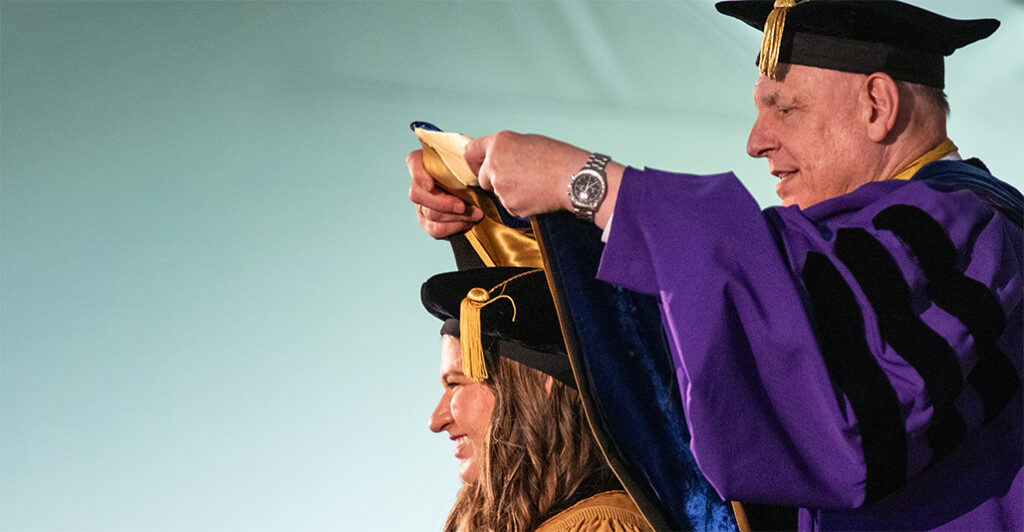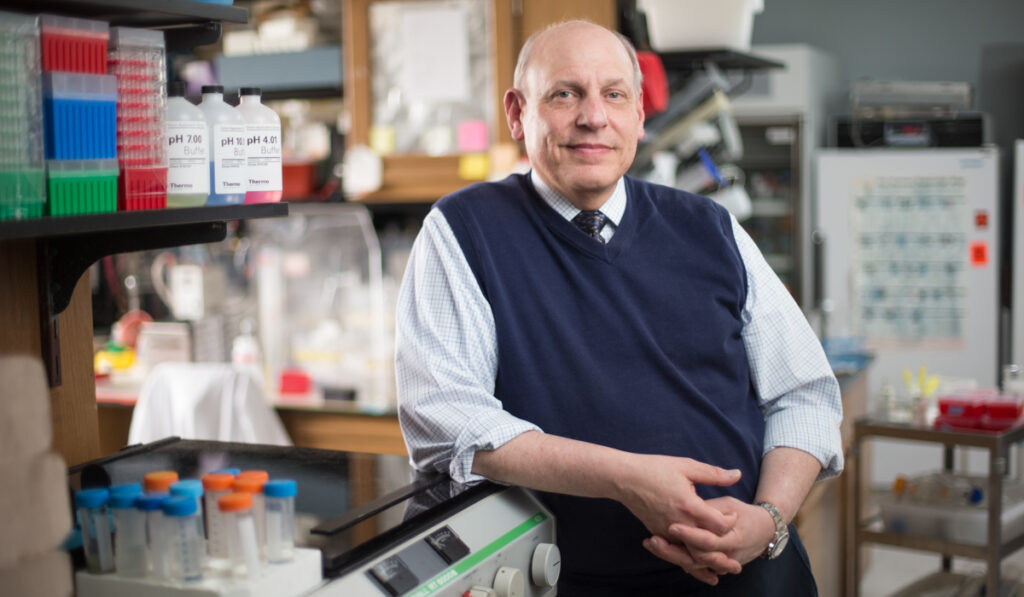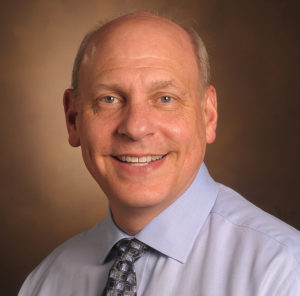Neil Osheroff, Ph.D., is John G. Coniglio Chair in Biochemistry and Professor of Biochemistry and Medicine (hematology/oncology) at Vanderbilt University School of Medicine.
He directs the Osheroff Lab investigating type II topoisomerases in DNA and has taught science at Vanderbilt Medical School for more than 40 years.
Osheroff sat down recently with Discoveries in Medicine to reflect on his distinguished career after receiving the prestigious Glaser Distinguished Teacher Award.
Below are excerpts from that conversation.
A “Radical New Curriculum”
Discoveries: How has medical education changed with the times?
Osheroff: In the 1950s, students could learn almost all the medical knowledge that they needed to know to become good physicians in medical school. Now, medical knowledge literally doubles every few weeks.
Consequently, in the six- to 12-week foundational science blocks that we have in the first year of medical school, we can no longer teach everything that students need to know throughout their career. Instead, we teach students the concepts underlying medical practice, how to think for themselves, what is quality material, and where to find it.
Back in the day, medical students memorized pathways, metabolic charts, every enzyme, and every body structure. Today, we teach students what we believe is most relevant to the practice of medicine and how to make connections; how one pathway affects another one.
Beyond the materials that we teach, we have changed the classroom, as well. No more podiums with distant seats. We created a learning space in our biomedical library that contains tables that each seat eight students. There are 14 screens around the room.
Because at any time, approximately one-quarter of the students are sitting with their backs to the lecturer, the room works best if lecturers wander throughout the class. This provides a much more intimate learning environment, enhances familiarity with students, and produces more personal interactions.
Discoveries: How did you develop and implement the curriculum changes at Vanderbilt?
Osheroff: We saw an opportunity to create something more authentic in basic science medical education. In 2007, in what we now call Curriculum 1.0, we moved from discipline-based semester-long courses to integrated scientific blocks. For example, we created an eight-week block that integrated biochemistry, genetics, cell biology, and histology.
The success of Curriculum 1.0 led to the development of a radical new Curriculum 2.0 in 2013. Rather than the traditional two-year science curriculum followed by the traditional two-year clinical curriculum, Curriculum 2.0 starts with a one-year pre-clerkship phase called Foundations of Medical Knowledge.
This is followed by a one-year clerkship phase in Clinical Care, and a two-year immersion phase that combines clinical electives, acting internships, at least three months of research, and four months of integrated science courses.
The science blocks in the Foundations of Medical Knowledge Phase utilize considerably higher levels of active learning. They are anchored by case-based learning groups in which eight to nine students with a faculty facilitator work through more that 70 cases over the course of the year.
Furthermore, the immersion phase is designed to help medical students figure out what direction they want their career to pursue. In fact, this phase is so highly individualized that in the years since its inception, no two students have taken the exact same curriculum in the same order.
Discoveries: Has the curriculum influenced other medical schools in the U.S. and worldwide?
Osheroff: We believe that Curriculum 2.0 sits on the leading edge of medical education. More than 100 U.S. and international medical schools have come to look at our curriculum. We have set a new standard in the way that we integrate foundational sciences and biomedicine.
Medical Knowledge + Relational Skills
Discoveries: Why do you consider basic science the foundation of clinical practice?
Osheroff: Let’s say that you receive a diagnosis of diabetes. In order to care for you properly, your physician needs to understand how glucose enters different tissues in your body, how this process is controlled by insulin, how glucose is utilized to generate energy, what happens when these systems go awry, and how your treatment acts to set things right. These are all science.
Science and clinical medicine go hand-in-hand. That is where our case-based learning is so effective, because it links all the clinical manifestations of disease with the underlying basic sciences.
“My goal is to create physicians who I would go to see as a patient.”
Discoveries: Explain why professionalism and team-building skills are included in your foundational science blocks?
Osheroff: From the first day of medical school, we work holistically to train students to become better physicians with leadership qualities, kindness, cultural humility, and proper communication skills.
In the same case-based learning groups , we have embedded competency-based milestones that include medical knowledge, patient care, professionalism, interpersonal communication skills, system-based practice involving teamwork, and practice-based learning and improvement.
In my opinion, the holistic training that takes place side-by-side with the students’ learning in the science blocks is one of the features that sets Vanderbilt apart from other medical schools.
Commitment to Innovation
Discoveries: What are you most proud of as a medical educator?
Osheroff: I am incredibly proud of the students that we have educated and of the important roles that scientists like me and my clinical colleagues have played in their lives.
In the early 2000s, I thought of my teaching as a way to give back to Vanderbilt. Now it is part of my core identity. I am still a bench scientist, and my DNA research laboratory is still going strong. But at this point in my career, I am actually better known internationally for my teaching and leadership in medical education.
Starting this summer, I will teach my 42nd medical school class of Vanderbilt medical students. It has been an incredible journey.

Discoveries: What message would you give to Vanderbilt’s medical students?
Osheroff: I tell our students that our way of teaching is state-of-the-art and that they should stay inquisitive and trust their faculty. My goal is to create physicians who I would go to see as a patient.




